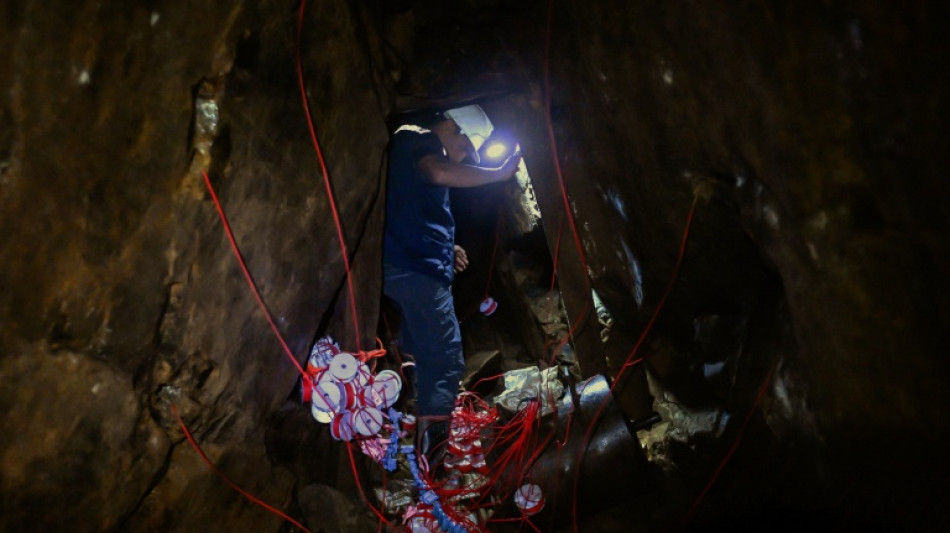
-
 Sinner's former physio to blame for failed dope tests, says ex-physical trainer
Sinner's former physio to blame for failed dope tests, says ex-physical trainer
-
Germany slams Trump tariffs, US tech titans in crosshairs

-
 Trump tariff blitz sparks retaliation threats, economic fears
Trump tariff blitz sparks retaliation threats, economic fears
-
Search for Malaysia's long missing MH370 suspended

-
 Hungary announces ICC withdrawal as Israel's Netanyahu visits
Hungary announces ICC withdrawal as Israel's Netanyahu visits
-
Trump's tariffs sting Asian giants, including US allies
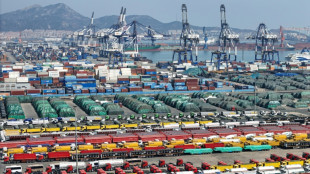
-
 India says 'examining the implications' of US tariffs
India says 'examining the implications' of US tariffs
-
Evenepoel set to make injury return at Tour de Romandie

-
 USA sole bidder for 2031 Women's World Cup, UK set to host in 2035 - Infantino
USA sole bidder for 2031 Women's World Cup, UK set to host in 2035 - Infantino
-
McLaren's Norris says it's 'our turn' for success

-
 Lessons and liquids: buried alive in Myanmar's earthquake
Lessons and liquids: buried alive in Myanmar's earthquake
-
Trump tariffs spark fears for Asian jobs, exporting sectors

-
 Stocks and dollar sink, havens rally as Trump tariffs fan trade war
Stocks and dollar sink, havens rally as Trump tariffs fan trade war
-
Runners fly to North Korea for first post-Covid Pyongyang Marathon

-
 Hamilton rubbishes claims he's lost faith in Ferrari
Hamilton rubbishes claims he's lost faith in Ferrari
-
Nintendo Switch 2 sparks excitement despite high price

-
 Sri Lanka's crackdown on dogs for India PM's visit sparks protest
Sri Lanka's crackdown on dogs for India PM's visit sparks protest
-
S Korea police raise security levels ahead of impeachment verdict

-
 China vows 'countermeasures' to sweeping new US tariffs
China vows 'countermeasures' to sweeping new US tariffs
-
Trump jolts allies, foes and markets with tariff blitz

-
 France says EU to target US online services after Trump tariffs
France says EU to target US online services after Trump tariffs
-
Tsunoda vows to bring 'something different' after Red Bull promotion

-
 Verstappen not happy with Tsunoda-Lawson Red Bull swap
Verstappen not happy with Tsunoda-Lawson Red Bull swap
-
Experts accuse 54 top Nicaragua officials of grave abuses

-
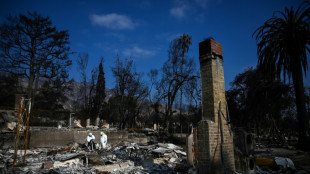 Remains of 30th victim of Los Angeles fires found
Remains of 30th victim of Los Angeles fires found
-
EU to target US online services after Trump tariffs: France

-
 How Trump's 'liberation day' tariffs will impact China
How Trump's 'liberation day' tariffs will impact China
-
Malaysia suspends search for long-missing flight MH370

-
 Search for long-missing flight MH370 suspended: Malaysia minister
Search for long-missing flight MH370 suspended: Malaysia minister
-
Europe hits out at Trump tariffs, keeps door open for talks

-
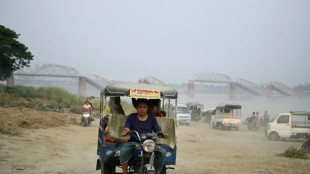 Myanmar's junta chief to head to Bangkok summit as quake toll surpasses 3,000
Myanmar's junta chief to head to Bangkok summit as quake toll surpasses 3,000
-
Lawson vows to prove he belongs in F1 after shock of Red Bull axing

-
 Australia sweats through hottest 12 months on record: official data
Australia sweats through hottest 12 months on record: official data
-
Livestock theft is central to jihadist economy in west Africa
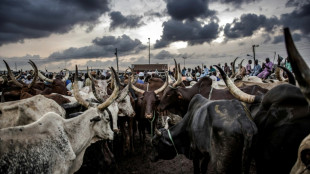
-
 South African artist champions hyenas in 'eco-queer' quest
South African artist champions hyenas in 'eco-queer' quest
-
Danish PM in 'unity' Greenland visit amid US takeover threats

-
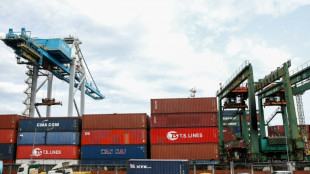 Taiwan says US tariffs 'highly unreasonable'
Taiwan says US tariffs 'highly unreasonable'
-
Lawson says ruthless Red Bull axing was 'tough to hear'

-
 Heat humble Celtics for sixth straight win, Thunder roll on
Heat humble Celtics for sixth straight win, Thunder roll on
-
Trump escalates trade war with sweeping global tariffs

-
 Japan says US tariffs 'extremely regrettable', may break WTO rules
Japan says US tariffs 'extremely regrettable', may break WTO rules
-
South Koreans anxious, angry as court to rule on impeached president

-
 Juve at in-form Roma with Champions League in the balance
Juve at in-form Roma with Champions League in the balance
-
Injuries put undermanned Bayern's title bid to the test

-
 Ovechkin scores 892nd goal -- three away from Gretzky's NHL record
Ovechkin scores 892nd goal -- three away from Gretzky's NHL record
-
Australian former rugby star Petaia signs for NFL's Chargers

-
 China says opposes new US tariffs, vows 'countermeasures'
China says opposes new US tariffs, vows 'countermeasures'
-
Athletics world watching as 'Grand Slam Track' prepares for launch

-
 Heat humble Celtics for sixth straight win, Cavs top Knicks
Heat humble Celtics for sixth straight win, Cavs top Knicks
-
Quake-hit Myanmar's junta chief to head to Bangkok summit
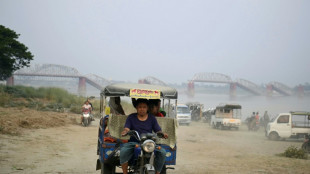

With blasts and grit, Colombia fights gold mines run by crime gangs
A thin detonating cord snakes its way into an illegal gold mine drilled high up on a mountain near the Colombian city of Cali, exploding with a roar and destroying a lucrative source of money for armed groups that include leftist rebels.
The blast brings down the walls of a tunnel leading into the pit in Farallones National Park, which features a stretch of the Andes that runs just outside Colombia's third largest city.
The entrance is now blocked by tons of rubble, putting that mine out of commission.
It took the engineers, police and city officials assigned to knock it out 10 hours to hike up to the mine, which was dug at an altitude of 3,400 meters (11,000 feet).
Wildcat miners operating under the control of local crime gangs and leftist rebels have been running mines like this for decades in these mist-covered mountains.
To isolate the gold, they use mercury, a toxic liquid metal that is polluting the water used in Cali, home to 2.2 million people.
"All that mercury goes into the ground" and ends up in rivers that supply its drinking water, said the chief engineer of the blasting operation, who for safety reasons did not want to give his name.
AFP accompanied the blasting team on a three-day climb in the mountains, with mules carrying the equipment.
The government estimates that 85 percent of the gold that Colombia exports comes from unlicensed mines.
The above-board mines yielded at least 248 tons of gold from 2017 to 2022, according to the United Nations.
In the Cali region, the grueling, freezing work of climbing a mountain to dig into it for gold is done by local people employed by local crime gangs.
These in turn pay a tax to rebels who have formed renegade, offshoot groups from the once powerful guerrilla army known as the FARC, which laid down its weapons under a historic 2016 peace accord after decades of fighting.
These FARC dissidents thus run a large network of illegal mines that extends beyond the Cali region.
- Working at an altitude -
While engineers prepare to set off the blast with a thick string of red cables, rifle-toting police wearing gas masks protect them.
The explosives themselves were brought to the site by helicopter.
One man sounds a siren to warn a blast is coming, then another activates a detonator that triggers the explosion and a cloud of white smoke.
As they camp at night, the team members see the lights of Cali in the distance, which hosted a UN conference on biodiversity in October and November.
Missions like this to take out unauthorizied mines have intensified in recent months.
Cali's deputy secretary for security, Alvaro Pretel, said crews have destroyed 11 fully operating mines and another 27 that were in the process of being dug.
The mine that AFP saw destroyed was no longer active, as miners had abandoned it under pressure from law enforcement.
- Water and mercury -
This particular spot high up in the mountains is the source of seven rivers that supply the city with water, said Pretel.
And just in the last year, nearly a ton of mercury was used in the mines outside Cali, he added.
The shiny, dangerous metal, he said, "sooner or later ends up in the drinking water of the people of Cali."
The government agency that oversees Colombia's national parks found around 420 digging pits in the Farallones park in 2019, Pretel said.
In 2022, the United Nations said it detected 69,000 hectares (170,500 acres) of land in Colombia where illegal gold mining was underway.
In May, officials said they found excessive levels of mercury and arsenic -- which is also used in gold mining -- near an aqueduct that routes to the city.
Experts say illegal mining can be even more lucrative than trafficking in cocaine.
At times, authorities have found mines with as many as 1,000 people working in them, who threw projectiles as police tried to move in and shut down the operation, said Gustavo Escobar, head of a police unit tasked with fighting illegal mining.
F.Pedersen--AMWN


